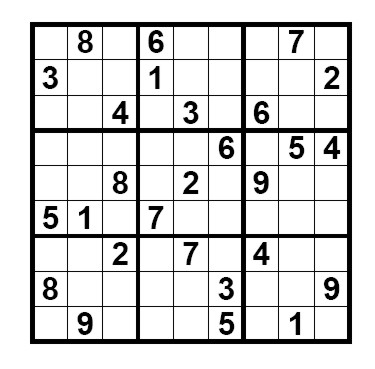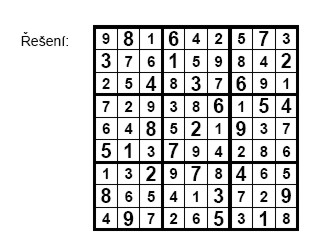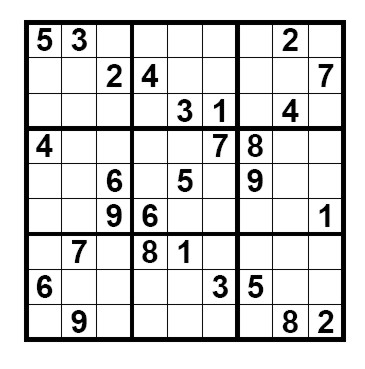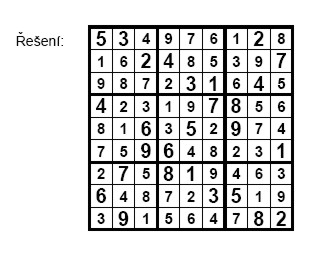Jakub Ondroušek has beaten the world record
 Fast Sudoku solving world record fulfilling given conditions was held so far by Belgian Vincent Bertrand. His time was 3 minutes 6 seconds. This achievement was reached at the World Sudoku Championship 2009 in Žilina, Slovakia and is written in the Guinness World Records.
Fast Sudoku solving world record fulfilling given conditions was held so far by Belgian Vincent Bertrand. His time was 3 minutes 6 seconds. This achievement was reached at the World Sudoku Championship 2009 in Žilina, Slovakia and is written in the Guinness World Records.
On Saturday June 12, 2010 there was a traditional the ‘Dobrý den’ Agency’s International Festival of Records and Curiosities in Pelhřimov. Three worlds Sudoku champions Jana Tylová, from Most, and Honza Krtek Novotný and Jakub Ondroušek, members of the Sudoku club Kabrňáci from Brno, pitted their strength there. It was mainly about setting the Czech national fast Sudoku solving record and then about its improving. At first there was warming up at ‘easy newspaper Sudoku puzzle’ and after that our world champions had two attempts with two Sudoku puzzles created by fivefold world puzzle champion Robert Babilon.
Jakub Ondroušek settled the Czech record of 2.53 minutes in the he first attempt started by the legendary runner and world record holder Jarmila Kratochvílová and under ‘Dobrý den’ Agency’s scrutiny.
The patron of the second attempt was sevenfold Olympic Games winner – a gymnast Věra Čáslavská. In this attempt Jakub Ondroušek beat his previous performance and improved the Czech record: Babilon’s master Sudoku was solved in unbelievable short time of 1 minute 25 seconds. So, Bertrand’s world record was beaten and markedly improved. And because Krtek’s time in the second attempt was 2:16 min, this means that the world record was beaten three times in Pelhřimov.
The fight was really exciting because Krtek always had the great start, whereas Kuba was excellent in the end. And the end was the crucial moment. Jana Tylová chimed in well, but smashing hot weather did its ‘fair whack’.
Great thanks to all people involved for their participation in the festival, for their good representation of SČHAK, and for the fact they were able to hold the audience and to give outstanding performances.
Zdeněk Chromý
The conditions for fast standard Sudoku solving competitions – STD-27
1. The solver has to fill in the grids with the single number 1 to 9 so that each number appears exactly once in every row, column and bolded 3x3 box.
2. There is measured the time made by the solver for completely correct solution of standard Sudoku (see below). The best achieved time is registered as the record.
3. The terms of standard Sudoku STD-27:STD-27:
a) The grid with 9x9 cells and with bolded 3x3 boxes.
b) In the grid there are given 27 single digits (one third of the whole number) from 1 to 9, each of them is there three times.
c) In each row, column and bolded 3x3 boxes there are exactly 3 single digits.
d) The arrangement of the digits must assure solubility directly and logically and there must be exactly one correct solution.
Sudoku 1
Author: Robert Babilon
Jakub Ondroušek’s time: 2 minutes 53 seconds
Sudoku 2
Author: Robert Babilon
Jakub Ondroušek’s time: 1 minute 25 seconds
Honza Krtek Novotný’s time: 2 minutes 16 seconds






Comments
I think similar to Kodyn. It
I think similar to Kodyn. It is not necessary to have a rule that makes puzzles of the same difficulty. If somebody likes to make an event to break the record he has an interest to make the puzzle as much easy as allowed by the rules. So it needs a lower border for this interest and the puzzle of attempts to break the record will be the simplest possible with this rules. And the rules give such a lower border. They are very simple and for almost everybody possible to verify. The record rules measure who can solve the simplest puzzles of this type in the shortest time. Why not such a record? By the way it gives a possibility to verfiy methods to measure the easyness of sudoku.
I think a minimal size of the grid should be added to make sure that it is possible to make the record with an audience.
Pyrrhon
Record rules
So I think, the rules are given right now.
These are good rules, because nobody can describe and prepare two puzzles with the same level of difficulty. Someone will like the puzzle and the other one doesn't.
By this rules it's not easy to make an easy puzzle (to breake the record), so if you try to make one you'll have to prepare lot of tables

Sure it's possible to prepare tables which will be solved under 1:30, but it won't be hundreds. If they should be unique
Everybody who likes sudoku solving and knows something about it knows, that the world record is only the way to make it more popular worldwide, but it's not very important. It's a record non-record or how to say it
Kodyn
Record Rules
Hello,
I would be very interested in publishing Sudoku records for our "Book of Alterntive Records" (http://www.alternativerecords.co.uk), but lack of generally accepted rules prevented me from doing so.
I would be happy if the discussion could lead to a consensus about fair rules.
In the field of mental calculation records, we ran into the same problem: For example the record on the fastest time to multiply two 8-digit numbers depends on the difficulty of the factors. Our answer was to require to solve ten randomly generated tasks correctly, this reduces the influence of "difficult" or "easy" numbers.
Ralf Laue
World Record
Having been a part of the "first" world record set many years ago when a book publisher wanted to do a publicity stunt and offered me a free trip to Washington DC, I can say that the standards of these records need to be made much more uniform to have meaning. That first time, I requested that the puzzles have a set number of digits (no more than 33), a set type of solving strategy (singles only should really be the definition for a "speed" record), and a consistent generator that would be made accessible in the future so that the same general rating for a puzzle (such as Easy or Very Easy) from that generator could be generated for a future attempt since the publisher wanted records for Very Easy and Easy sudoku puzzles but as we all know different sources rate puzzles much differently (and some start their scale at Easy, not Very Easy). I also felt the best record, much as say the Rubik's Cube speed solving record, would be to time 5 attempts at uniformly difficult puzzles, and keep the middle of the 3 times as the average to use.
Needless to say, the organization running the publicity stunt did not care as much about sudoku record standards as I did so when I set the first sudoku records (something like 1'36 and 2'04) they weren't on puzzles as easy as they should have been, and others found even easier sources of puzzles (with many more givens) to repeat the record attempts to break my time. A separate kind of record was generated by the Slovaks with this Sudoku-27 definition, to separate it from mine, which was contested first at the Slovakian national championship in 2008 and then at the WPC in 2009.
I actually find some aspects of the 27 clue standard reasonable, but the particular problem with the definition is exactly what Marcel and Kodyn are pointing out which is that it does not describe the kind of solution steps needed to solve the puzzle and does not try to tie the difficulty of the puzzle to some computer score for standardization.
What might be nice to do, actually, is to keep aspects of the 27 clue concept, but get a dozen or more puzzles that all solve with simple steps and are close in time (and should solve for someone like jaku111 in about 60 seconds). Sudoku allows for many isomorphic forms of the same grid by digit replacement, row/column swapping, and rotations or reflections, that would have exactly the same difficulty and so from the dozen or more seeds, one could make millions to billions of sudoku that would be fair record setting puzzles at any targeted level.
WR - jaku111
I don't think that it is possible to find some rules...
This WR is pointless... But someone has prepare it and has show it worldwide so this was an opportunity to beat the record...
And Robert Babilon (aka Bingo) is a very good author, so he prepared more puzzles according to this stupid rules to show, that it's possible to prepare a simple puzzle where the player doesn't need to use guess...
That's all. It's not 100m race, it's sudoku and there couldn't be the puzzles the same...
Kodyn
No surprise
I congratulate Jakub for his new world record. He is certainly currently the best Sudoku player in the world and I would certainly not have been able to solve this problem in a similar time. At the same time however what I expected would happen after the WSC 2009 has happened. I consider the rules to construct the Sudoku for World record attempts to be meaningless because those rules do not translate into a real difficulty level of the Sudoku and this new world record has proven this. In fact, the world record Sudoku from the WSC 2009 was *extremely" difficult and by humans could only be solved by bifurcation. This new world record Sudoku however was an easy Sudoku that only required singles and block/line reduction for solving. As such, I consider that the times used to solve this Sudoku are not xomparable with the record of Vicent Bertrand and it comes to no suprise to me that actually more than one player was faster this time.
In essence, to be comparable, there need to be better rules on how to construct a Sudoku for world record attempts, and I actually think it will never be possible to construct real good rules that lead to really comparable results.
Marcel